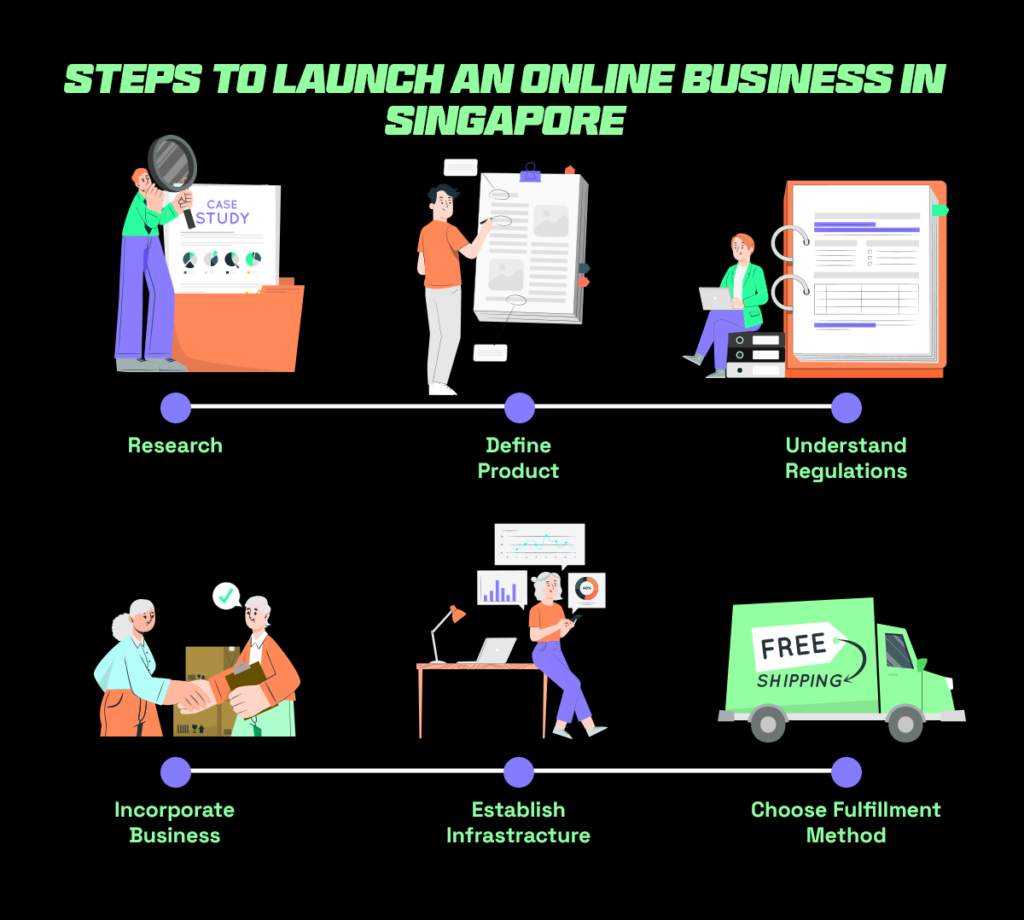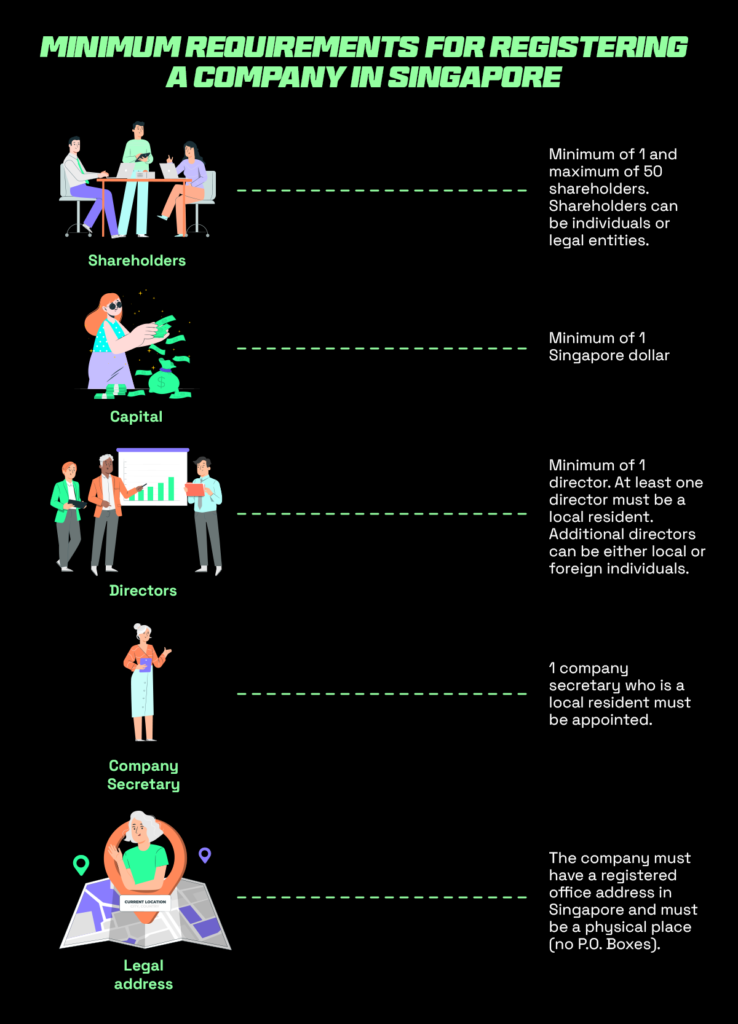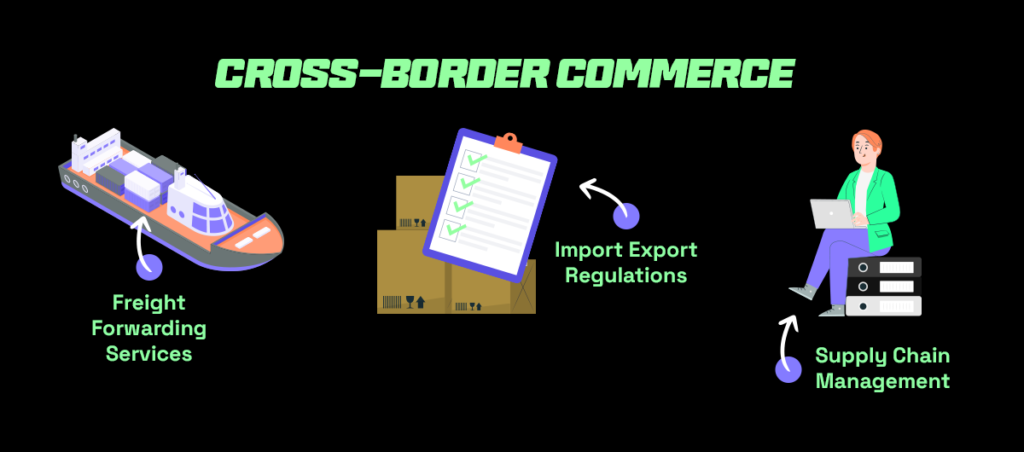Singapore’s e-commerce market is thriving, with consumers shopping online more than ever before. The gross merchandise volume of Singapore’s e-commerce market is estimated to reach US$11 billion by 2025. Data shows that there’s no better time than now to learn how to start an online business in Singapore.
The average shopper in Singapore spends about $785 every year on online purchases, making this a highly lucrative market for retailers. However, this opportunity also brings substantial competition. For instance, Lazada hosts 155,000 sellers on its platform, which means numerous merchants vying for attention in every product category.
If you are a retailer looking to start an online business in Singapore, it’s crucial to understand the dynamics at play. While the potential for success is high, standing out in a crowded marketplace requires a strategic plan. This blog highlights each step you need to complete to get started. Here’s how to launch a successful online business in Singapore 101!
How to start an online business in Singapore?

Step 1: Research and create a plan for your Singapore online business
In Singapore, consumers are increasingly turning to online shopping thanks to high-speed internet, flexible payment methods, and a thriving ICT infrastructure. The Government has also played a key role in empowering merchants and driving e-commerce growth. For retailers looking to expand into the online sphere, there is no better time than now! So how do you get started?
Starting an online business in Singapore requires a strong foundation built on thorough research and strategic planning. This first step will help you gain a clear picture of the market landscape, your potential customers, and the competitive environment.
- Analyze the competition and identify market gaps: Major players like Shopee, Shopify, Lazada, TikTok Shop, and Amazon dominate Singapore’s e-commerce scene. For instance, Shopee receives 1.5 million organic visitors monthly, while Lazada receives 99.6k. These platforms attract a large number of shoppers by offering benefits like express delivery and discounts. To differentiate yourself, look for glaring market gaps or unique niches. Study how competitors price their products and what value-added services they offer. By analyzing their pricing strategies, you can decide whether to position your business as a more affordable alternative or a premium brand.
- Identify your target audience: In Singapore, 46% of online shoppers are between 26-34, while only 15% of them are above 45. Understanding key demographics is the first step towards marketing a successful online business in Singapore. Key findings from a recent Bain report indicate that:
- 39% of consumers have reduced spending because of economic instability and rising cost of living.
- The largest reduction in spending was observed for electronics and alcohol.
- New technologies like VR, A, and health tech will impact how businesses interact with shoppers.
- Some brands might be new to the market but grow at a rapid pace earning the title of insurgent disruptor. This is primarily seen in the beauty and packaged food industry.
- Make use of data insights: Market reports and online tools can give you valuable data on consumer preferences and buying habits. For example, data shows that most online shoppers in Singapore prefer flexible payment methods. The price range for getting conversions from Facebook ads hovers below $100. Using these insights, you can better align your brand messaging with what appeals most to your target customers.
Step 2: Define your business’ product or service
Once you’ve conducted market research and set a clear plan, the next step is to define the product or service you’ll offer. Combining a premium service with your product can also be a key factor that differentiates your Singapore online business.
The product that you’re offering should solve your target audience’s pain points while fitting into their budget. Testing your product ideas through soft launches can provide invaluable feedback and help you refine your offerings. Finally, secure reliable suppliers or manufacturers. Reliable sourcing ensures quality and timely delivery, which is vital for building trust in your brand. Using integrated logistics solutions like Locad can streamline your operations by handling warehousing, shipping, and inventory in one platform. This removes the hassle of dealing with multiple partners and ensures timely deliveries.
Step 3: Understand Singapore’s regulations for online businesses
Operating within the legal framework is critical for ensuring compliance and avoiding penalties for your online business in Singapore. There are a number of laws in place to boost consumer confidence.
- The Singapore Broadcasting Authority Act treats all internet content in Singapore, including e-commerce websites, as broadcast media. It sets rules for what can be shared on websites or e-commerce platforms and explains the licensing process for online retailers.
- The Electronics Transactions Act (ETA) makes electronic records, signatures, and contracts legally valid to support e-commerce activities.
- The Licensed Warehouse Scheme lets approved companies store imported goods like liquor and tobacco without paying duties or GST until they use or export them. This scheme includes three types of licenses, each with specific requirements.
- Mandatory Packaging Reporting (MPR): This scheme requires businesses to report on the types and weights of packaging they produce, import, or sell. Companies must also submit their 3R (reduce, reuse, recycle) plans to the National Environment Agency (NEA). The aim is to increase awareness and incentivize businesses to adopt more sustainable packaging practices.
- The Personal Data Protection Act (PDPA) requires online businesses to follow rules on collecting, using, and sharing personal data.
Since 2004, Singapore has recorded 33,747,180 data breaches.
Protect customer data with Locad’s secure Order Management System (OMS). We ensure compliance with Singapore’s PDPA and safeguard sensitive information throughout fulfillment.
Step 4: Incorporate your online business in Singapore

To proceed with incorporation, you will need to register your business with the Accounting and Corporate Regulatory Authority (ACRA). This process can be completed online through the ACRA website.
- Select a unique name for your company that complies with ACRA guidelines, ensuring it is not already in use or offensive. You can check name availability through the ACRA website or external tools.
- Determine the business structure for your online business. This could include Sole Proprietorship, General Partnership, Limited Liability Partnership (LLP), and Limited Liability Company (LLC).
- SSIC Code: At the time of setting up your business, it is mandatory to select an SSIC code. SSIC code describes the intended business and is used for static government purposes.
- The documents you need to proceed with the registration are:
- Identity proof: Passports or Singapore Identity Cards (NRIC) for all directors, shareholders, and Ultimate Beneficial Owners (UBO).
- Residential address proof (recent utility bills, bank statements, or official correspondence showing the residential address).
- Proof of professional background (a Resume or LinkedIn profile).
- Complete the KYC process:
- Verification of Identity and Address
- Background checks to ensure no history of involvement in illegal activities
- At this stage, if the details provided are satisfactory, the incorporation process will continue.
- Apply for the approval of your business name with the ACRA. After approval, the chosen name will be reserved for 120 days from the date of application.
- Once the company name is approved, the following documents need to be submitted:
- Company Constitution (previously known as Memorandum and Articles of Association).
- Consent to Act as Director.
- Consent to Act as Company Secretary.
- Declaration of Compliance.
- Submit all the above documents with the ACRA through the online portal BizFile+. Once approved, you will receive an email confirming the registration of your Singapore online business. This process usually takes a few hours.
- After completing the registration process, open a corporate bank account in Singapore using your Certificate of Incorporation and other required documents. You may also need to obtain your GST registration and business license.
Are you a foreigner looking to launch your online business in Singapore?
Locad’s Seller of Record (SOR) service handles compliance, taxes, and operations, letting you focus on growing your business.
Step 5: Establish the infrastructure for your Singapore online business
Establishing the infrastructure of your company includes setting up the digital and physical components that will help you run your business efficiently.
- Website Development: Create a user-friendly website that is optimized for search engines and mobile devices. This is important as ~ 85% of consumers in Singapore shop via their mobile. Popular platforms like Shopee, Lazada, and WooCommerce, offer a range of features that can help you create a user-friendly online store.
- Domain Name Registration: Secure a domain name that reflects your business and is easy to remember.
- Payment gateway integration: Choose reliable payment gateways (e.g., PayPal,) to facilitate secure online transactions. The most popular payment methods in Singapore include credit cards, digital wallets, bank transfer and buy now pay later.
Create a seamless online store with platforms like Shopee, Amazon, Lazada, and TikTok Shop.
Locad integrates with them and offers custom website integration for a tailored experience.
Step 6: Choose your order fulfillment method
Efficient order fulfillment is crucial for the success of your online business in Singapore. End-to-end fulfillment providers like Locad can help you scale your business without worrying about the operations. A few factors to keep in mind when selecting a logistics provider are:
- Multichannel order fulfillment – Shoppers in Singapore frequently visit multiple marketplaces before they make a purchase. Popular online platforms include Shopee, Lazada, and Amazon. In addition, data shows that about 50% of shoppers browse online before making a purchase in a physical store. Hence, it becomes essential to maintain a strong presence across multiple channels to capture attention at every possible touchpoint. Locad’s specialized logistics engine helps you consolidate orders from all platforms into a single, efficient fulfillment process. This helps minimize errors and boost delivery speed.
- Flexible warehouse infrastructure: Due to the high cost of commercial space, having flexibile in warehousing is critical. With Locad, you only pay for the inventory you use, avoiding unnecessary overhead costs. This allows you to scale efficiently while managing your expenses effectively.
- High accuracy in order processing – Accuracy is vital for customer satisfaction and trust. Locad’s dashboard provides merchants with real-time insights into stock movement, helping them manage inventory efficiently. Our camera-equipped warehouses ensure that orders are packed and shipped in optimal condition, further enhancing reliability and customer confidence.
- Cost of shipping – High shipping costs are one of the biggest challenges for both consumers and retailers. Surveys show that consumers hate paying shipping fees more than anything. Locad helps you optimize expenses by choosing the most cost-effective last-mile carriers based on your location and shipment type. With Locad, you balance both cost and speed while staying competitive!
- Speed of delivery – 56% of consumers in Singapore share that delivery delays are the primary reason for abandoning shopping carts. Today more and more shoppers expect fast delivery, irrespective of where the drop location is. By strategically storing inventory closest to your customers, Locad can significantly reduce shipping times, ensuring that orders arrive promptly. This not only meets customer expectations but also enhances overall satisfaction, leading to increased loyalty and repeat purchases.
- Technology integration for real-time insights – Real-time data allows you to make informed, timely decisions. Locad’s engine provides advanced data insights on inventory, orders, and fulfillment metrics. You can also see a comprehensive overview of sales performance and how quickly your inventory is moving. Additionally, we help you generate detailed reports that analyze trends and performance, enabling you to make strategic decisions that drive your business forward.
- Effective customer service – Exceptional customer service is crucial for supporting retailers as they navigate their logistics challenges. Locad provides a robust ticketing system that ensures all retailer inquiries are handled promptly and efficiently, allowing for quick resolutions to any issues that arise. Additionally, our premium offering includes a dedicated account manager who offers personalized support and guidance.
Starting a Business in Singapore as a Foreigner
Starting an online business in Singapore as a foreigner is often challenging due to regulatory requirements, but services like Locad’s Cross Border Commerce simplify the process significantly.

- Importer of Record (IOR): As your IOR, Locad manages the importation process for your goods, ensuring compliance with Singapore’s import regulations. This includes handling duties, taxes, and necessary customs documentation, allowing your products to enter Singapore smoothly.
- Seller of Record (SOR): Locad also functions as the Seller of Record (SOR), taking on the legal responsibility for the sale of goods. This role involves managing sales transactions, overseeing compliance with local laws, and ensuring proper documentation. With Locad as the SOR, foreign businesses don’t need to worry about local regulations and can focus on growth.
- Freight Forwarding: Locad’s freight forwarding services simplify the shipping process from manufacturers to distribution points in Singapore, covering both air and sea transport options. This ensures timely delivery while balancing cost and speed, which is crucial for online businesses.
- Value-Added Services: Locad goes beyond basic logistics by providing value-added services such as specialized packaging, bundling, and labeling. These services help businesses meet local regulations and enhance product appeal. It’s beneficial for foreign companies aiming to cater to Singaporean customers with customized product packaging and presentation.
Conclusion
The e-commerce landscape in Singapore is constantly evolving, and staying ahead requires a proactive approach. As you take these essential steps, remember that the key to success lies in understanding your audience, leveraging technology, and staying adaptable. With Locad as your fulfillment partner, you can carve out a niche, grow your business, and build lasting connections with your customers. Embrace the opportunities ahead, and let your online venture thrive in this dynamic marketplace. The future of your business starts now!











